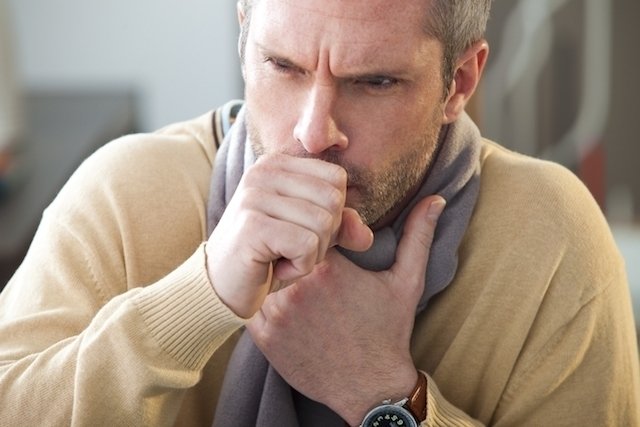An itchy throat can be caused by allergies, exposure to irritating substances, infections, and other situations that are relatively easy to treat. It may also be a sign of a health condition, like GERD, a cold or even medication side effects.
Itchy throats are often occurs accompanied by a dry cough, as coughing is a defense mechanism the body employs to protect the throat from a possibly irritating stimulant. Other symptoms that can occur with an itchy throat include a sore throat, runny nose, and sneezing.
You should see a doctor if you itchy throat does not resolve within a few days, if it progressively worsens, or if it presents with symptoms like a worsening cough, dizziness, shortness of breath, tearing eyes or skin itching.

What causes an itchy throat?
An itchy throat can occur as a result of:
1. Dehydration
Dehydration is characterized by an insufficient quantity of water in the body due to factors like decreased fluid intake, diarrhea, vomiting, prolonged exposure in the sun or excess sweating.
Dehydration can cause symptoms like an itchy throat, thirst, decreased urine output, low blood pressure, or dry mouth, skin or eyes. In more serious cases, it can increase heart rate and cause dizziness.
Treatment: Your fluid intake should amount to at least 2 L of water per day, and can be made-up of water, tea, natural juices or soup. You can also make a homemade saline solution to drink throughout the day, or eat foods with a high water content, like watermelon, oranges and pineapple.
2. Allergies
Allergies can cause a reaction that stimulates allergic rhinitis. This condition can cause symptoms like sneezing, runny nose, dry cough, and itchy nose or throat. This condition usually emerges after contact with allergic substances, like dust, animal fur, pollen or some plants, and is most frequent in the spring and fall.
Treatment: There is no cure for allergic rhinitis, but symptoms can be managed with anti-histamines like loratadine or cetirizine or by performing a nasal irrigation with saline. You should avoid contact with the substances that triggered the allergy symptoms.
Also recommended: 5 Allergic Rhinitis Medications Your Doctor Can Prescribe tuasaude.com/en/allergic-rhinitis-medications3. Exposure to irritating substances
Exposure to irritating substances like tobacco smoke, smoke from car exhaust pipes, cleaning products or other toxic substances can irritate the throat, causing itching and coughing.
Treatment: Avoiding exposure to substances that trigger your itchy throat is the best way to prevent this symptom. If avoidance is not possible, you can suck on soothing throat lozenges that contain honey, lemon or ginger, or perform throat rinses by gargling a water and salt solution.
4. Medication side-effects
Some medications can result in an itchy throat as a side-effect. This should not be confused for an allergic reaction. This is actually a frequent symptom in people who take ACE-inhibitors to lower blood pressure.
Treatment: Usually this side-effect subsides over time. However, if it causes a lot of discomfort, you can discuss swapping the medication for an alternative with your doctor. To relieve the itching, you can swallow a spoon of honey, rinse your throat with salt-water gargles, or drink a lemon and ginger tea.
5. Food allergy
A food allergy is characterized by an exaggerated inflammatory response to a specific substance that is found in food. Inflammation can affect various parts of the body, like the mouth, eyelids and tongue, which can make breathing more difficult.
Allergies to medication is very similar to food allergies, however the allergic substance is usually more easily identified as the allergy response is typically much quicker.
Treatment: Treatment consists of the administration of antihistamines like loratadine or cetirizine, or steroids like prednisolone. In serious cases, medications alone may not be sufficient and you should proceed to the emergency room immediately, as the allergy and evolve into an anaphylactic shock.
It is important to complete food allergy testing so that any triggering food can be avoided in the future.
6. Cold or tonsil infection
Some respiratory infections, like a tonsil infection, pharyngitis or a cold, can leave your throat itchy before developing into more serious symptoms, like pain and local inflammation. Other symptoms may include runny nose, sore throat, coughing, fever, ear itching, chills and discomfort.
Also recommended: Cold vs Flu: Main Differences, How to Treat & Home Remedies tuasaude.com/en/cold-vs-fluTreatment: Treatment should be guided by a family doctor or ENT specialist, who may prescribe anti-inflammatories or analgesic to relieve symptoms. Antibiotics may be prescribed for a bacterial infection.
Also recommended: Get Rid of a Sore Throat Fast: Home Remedies & Medication tuasaude.com/en/how-to-get-rid-of-a-sore-throat7. Gastroesophageal reflux disease (GERD)
GERD is characterized by the back-up of stomach content into the esophagus toward the mouth. It causes symptoms like pain, foul taste, and in some cases, itchy throat, due to irritation from stomach acid. It occurs when muscles at the bottom of the esophagus that block acid are not functioning appropriately.
Treatment: Treatment for GERD consists of taking antacids to neutralize stomach acid to avoid the burning sensation in the esophagus. Prokinetics can also be taken to speed-up stomach emptying, which reduces the time that food stays in the stomach. Learn more about the GERD diet your doctor may recommend to help manage symptoms.
